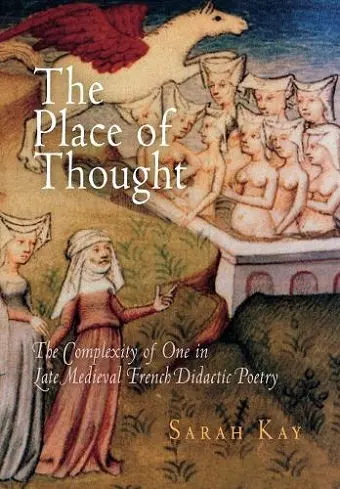The Place of Thought
The Complexity of One in Late Medieval French Didactic Poetry
Format:Hardback
Publisher:University of Pennsylvania Press
Published:24th Apr '07
Currently unavailable, and unfortunately no date known when it will be back

"This book is quite simply the most important, intellectually ambitious, and far-reaching endeavor in recent years."—Stephen G. Nichols, Johns Hopkins University
"This book is quite simply the most important, intellectually ambitious, and far-reaching endeavor in recent years."-Stephen G. Nichols, Johns Hopkins University
From Jean de Meun in the late thirteenth century to Christine de Pizan in the early fifteenth, medieval French poets often aimed to impart theological, philosophical, or moral ideas. To unify their thought, and to make its outline visible to readers, the poets created vivid images of place, such as gardens, paths, idyllic landscapes, cities, trees, and fountains. For Sarah Kay, these spatial images are a prop of "monologism," helping to communicate (or impose) unity of meaning and interpretation by summoning readers to occupy the same "place" in their thinking as the authors. Because of this monologism, Kay contends, didactic poetry has been ill served by a critical tradition that favors difference, plurality, and dialogism. In The Place of Thought, she seeks radically to reassess this literature and reappraise the pleasure to be derived from reading it.
Kay argues that one meaning is not inherently simpler or less interesting than many meanings. Using specific works as examples, she demonstrates that this "one-ness" of thought in French didactic poems can be an excitingly complex and challenging notion, and that it strains the images in which it is placed to the point where they become difficult to visualize. Herein lies the poems' simultaneous intellectual and aesthetic appeal. Focusing on the Roman de la Rose by Jean de Meun, the Breviari d'amor by Matfre Ermengaud, the Ovide moralisé, Pèlerinage de vie humaine by Guillaume de Deguileville's, Le Jugement dou roy de Navarre by Guillaume de Machaut, Le Joli buisson de Jonece by Jean Froissart, and Le Livre du Chemin de long estude by Christine de Pizan, Kay traces the works' backgrounds in scholastic thinking, illuminating them when appropriate with modern reflections on the same ideas.
"This book is quite simply the most important, intellectually ambitious, and far-reaching endeavor in recent years." * Stephen G. Nichols, Johns Hopkins University *
"An invaluable resource not only for students of French medieval literature but for any reader interested in the conjunction of philosophy and poetry." * Speculum *
"In Kay's book we discover an extraordinary piece of scholarship that refuses to be contained, much like the philosophical inquiry she examines, and that demands a complete shift both in the way we approach late-medieval didactic literature and in literary scholarship as practiced today." * The French Review *
ISBN: 9780812240078
Dimensions: unknown
Weight: unknown
248 pages